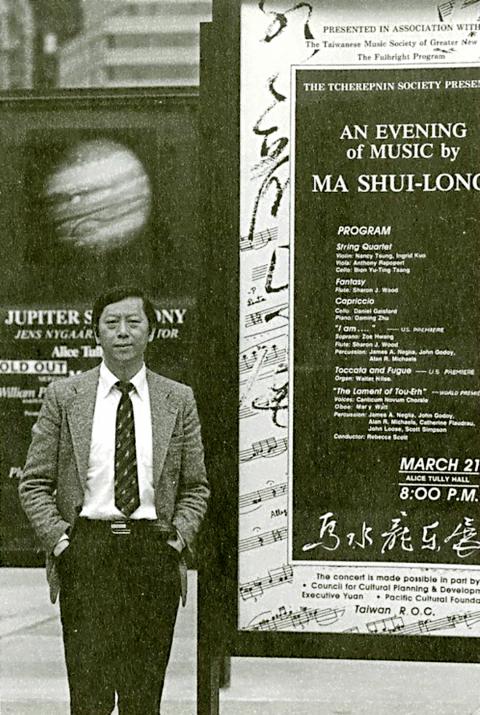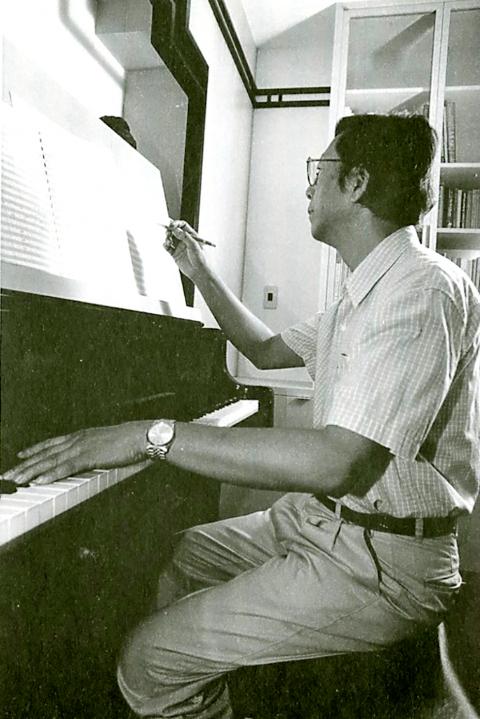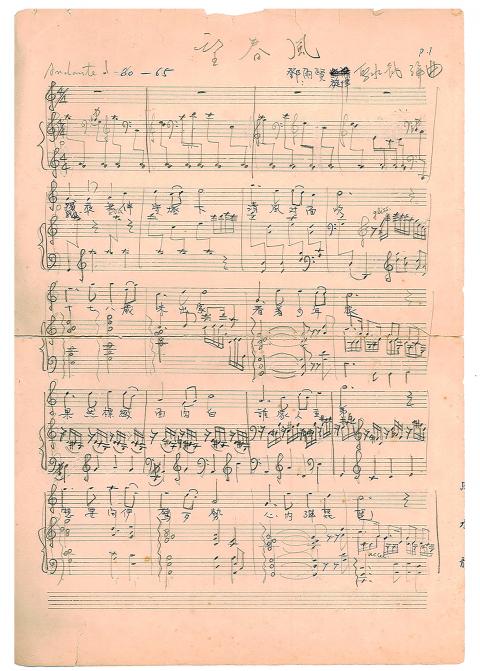July 16 to July 22
The news was mostly overshadowed by the 22nd Golden Bell Awards, but on March 21, 1987 Ma Shui-long (馬水龍) became the first Taiwanese composer to have his work performed at New York’s Lincoln Center for the Performing Arts.
Some sources — including his biography, Musical Maverick: Ma Shui-long (音樂獨行俠馬水龍) — maintain that he was the first composer from the Far East to have a solo show at the prestigious performance hall. However, the honor only received a brief mention in the Central Daily News (中央日報) entertainment section under the title, “Composer Ma Shui-long debuts new material today in the US.”

Photo courtesy of Taiwan Music Institute
Born on July 17, 1939, Ma was just 47 years old.
FUSING EAST AND WEST
Despite the newspaper headline, it appears that just one of the six songs in the program was new — an adaptation of a Yuan Dynasty play, The Injustice of Dou E (竇娥冤), which featured only vocals, suona horn (嗩吶) and a variety of percussion instruments. The study, When Tradition Becomes Modern (當傳統成為現代), notes that while the song is deeply rooted in Eastern traditions, Ma took many liberties to modernize it.

Photo courtesy of Taiwan Music Institute
“The chorus provides a rich layering that’s often missing in traditional Chinese music. The composer’s decision not to use lyrics may have been for the convenience of the performers and for those in the audience who didn’t understand Chinese. But not only has it erased language barriers, it also removes the barrier between voice and instrumentation,” the study states. “Perhaps the combination of suona and chorus can serve as an example of the fusion of East and West.”
Ma’s unique approach earned him praise from notable New York Times music critic Bernard Holland two days later.
Holland writes that Ma “balanced the largely conventional use of Western instruments with the pure intervallic skips and pentatonic melody from his own culture — and it did so without descending into the usual cloying chinoiseries.”

Photo courtesy of National Central Library
“How does he do it? Partly by letting his instruments speak in a European voice but with an Asian mind.”
In addition to Chinese classics, Ma also rearranged Taiwanese folk songs such as the classics Yearning for Spring (望春風) and Mending the Net (補破網). He also composed his own Taiwan-inspired material such as Thoughts of Kuandu (關渡隨想) as well as the score for Cloud Gate Dance Theatre’s 1979 production Liao Tien-ting (廖添丁), a performance about the legendary anti-Japanese “Robin Hood” of Taiwan. He expanded the latter into an orchestral suite in 1988.
As a music professor, Ma strongly believed that cultural preservation and protecting traditions was an “inescapable responsibility,” according to a brief biography by the National Central Library. He would frequently warn his students that while learning Western instruments, theory and techniques, they should not forget their origins, insisting that each student learn at least one traditional instrument.
“He was not anti-Western, but he did not want to see music, or even culture in general completely lean toward the West. He also was a proponent of ‘world music,’ which he thought could loosen Western music’s dominance,” the report stated.
ROAD TO NEW YORK
Ma grew up in the coastal towns of Keelung and Jiufen, and in the 2008 essay, My Musical Journey of Composition (我的創作心路歷程), he notes that his biggest influences remain the classical beiguan, nanguan and Taiwanese Opera he was exposed to in his youth.
Like many Keelung boys, Ma enrolled in a vocational high school that would prepare him for a maritime career. However, fate changed when his father became ill, causing him to drop out and find work as draftsman at a fertilizer factory. One of Ma’s coworkers was future musicologist Lee Che-yang (李哲洋), who encouraged him to pursue his passion in art and music.
After his father’s recovery, Ma enrolled in the composition department at National Taiwan University of the Arts and began his musical journey. After teaching for several years, he received a full scholarship to study at the Regensburg Music Academy in Germany.
“During this period, all I learned was Western musical theory and methods for Western composition. Although these lessons provided me the requisite knowledge and skills for composition, they hardly fulfilled my expectations for expressing musical aesthetics and philosophy,” he writes.
“To be able to compete with Western musicians on the international stage, we must use our own musical language. What else do we have?”
In 1986, Ma earned a Fulbright scholarship to spend a year in the US as a visiting scholar. During a gathering, an American scholar remarked that Easterners are eager to learn about the West. “That is great. But when you’re getting to know about us, why don’t you let us know about you?”
These words lit a fire in Ma’s heart, and he was determined to have his work performed in the US. Not just any venue — he had his sights set on the Lincoln Center. Although people told him it was just a pipe dream, he managed to make it happen with the help of The Tcherepnin Society, a non-profit dedicated to promoting music.
That night, the concert hall was packed — not just with local music aficionados but also a large contingent of Taiwanese Americans who came to show their support. The concert’s success led to three more shows in Washington DC, San Francisco and Los Angeles, by far exceeding his original goal.
Taiwan in Time, a column about Taiwan’s history that is published every Sunday, spotlights important or interesting events around the nation that have anniversaries this week.

Towering high above Taiwan’s capital city at 508 meters, Taipei 101 dominates the skyline. The earthquake-proof skyscraper of steel and glass has captured the imagination of professional rock climber Alex Honnold for more than a decade. Tomorrow morning, he will climb it in his signature free solo style — without ropes or protective equipment. And Netflix will broadcast it — live. The event’s announcement has drawn both excitement and trepidation, as well as some concerns over the ethical implications of attempting such a high-risk endeavor on live broadcast. Many have questioned Honnold’s desire to continues his free-solo climbs now that he’s a

As Taiwan’s second most populous city, Taichung looms large in the electoral map. Taiwanese political commentators describe it — along with neighboring Changhua County — as Taiwan’s “swing states” (搖擺州), which is a curious direct borrowing from American election terminology. In the early post-Martial Law era, Taichung was referred to as a “desert of democracy” because while the Democratic Progressive Party (DPP) was winning elections in the north and south, Taichung remained staunchly loyal to the Chinese Nationalist Party (KMT). That changed over time, but in both Changhua and Taichung, the DPP still suffers from a “one-term curse,” with the

Jan. 26 to Feb. 1 Nearly 90 years after it was last recorded, the Basay language was taught in a classroom for the first time in September last year. Over the following three months, students learned its sounds along with the customs and folktales of the Ketagalan people, who once spoke it across northern Taiwan. Although each Ketagalan settlement had its own language, Basay functioned as a common trade language. By the late 19th century, it had largely fallen out of daily use as speakers shifted to Hoklo (commonly known as Taiwanese), surviving only in fragments remembered by the elderly. In

Lines between cop and criminal get murky in Joe Carnahan’s The Rip, a crime thriller set across one foggy Miami night, starring Matt Damon and Ben Affleck. Damon and Affleck, of course, are so closely associated with Boston — most recently they produced the 2024 heist movie The Instigators there — that a detour to South Florida puts them, a little awkwardly, in an entirely different movie landscape. This is Miami Vice territory or Elmore Leonard Land, not Southie or The Town. In The Rip, they play Miami narcotics officers who come upon a cartel stash house that Lt. Dane Dumars (Damon)